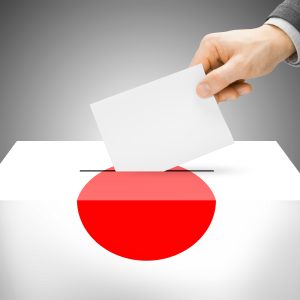Japan will head to the polls on Sunday to decide if new Prime Minister Kishida Fumio and his Liberal Democratic Party (LDP) will retain a majority in the House of Representatives.
The general election, which takes place every four years, is considered the toughest test for the LDP in nearly a decade, with Japan’s largest opposition party, the Constitutional Democratic Party (CDP), forming an alliance with the Japan Communist Party (JCP) in an effort to unseat the ruling coalition.
The LDP faces tough competition, with five opposition parties fielding a single candidate in some 132 constituencies. This has turned almost half of the single-seat constituencies into a one-on-one battle between the ruling LDP- Komeito coalition and the opposition.
With campaigning in its final stages, the latest polling predicts the LDP will win a simple majority of 236 out of the 465 seats, with coalition partner Komeito retaining its 29 seats. The LDP currently holds 274 seats. Meanwhile, the opposition is predicted to make substantial gains from its current seat counts – 110 for the CDP and 12 for the JCP – thanks to the coordination of opposition party candidates.
In the previous lower house election in 2017, the ruling LDP and the opposition fought one-on-one in only 57 constituencies. This was due to the split of the then-largest opposition party, the Democratic Party, with some forming today’s CDP and other joining Tokyo Governor Koike Yuriko’s Party of Hope. That division is said to have helped the LDP win amid a chaotic number of opposition candidates.
Kishida only took power last month after winning the LDP presidential election, but his party has been in power since 2012. Kishida, who has been called the “the status quo candidate,” won the LDP leadership race last month by sticking to safe policies that won favor with the conservative political elite within the LDP. But at the same time Kishida also vowed to reform the LDP to “regain public trust,” citing distrust of politics as a major contributor to low voter turnout.
Japan has a serious problem with voter turnout. In the 2017 lower house election, barely half the population voted. Japan ranks 139th of 196 countries in voter participation, according to the International Institute for Democracy and Electoral Assistance, which highlights a worrying pattern of political indifference. Since the legal age for voting was lowered from 20 to 18 in 2016, low voter turnout among young people has become even more prominent, with 41 percent of young people answering in a survey conducted by Minami-Nihon Shimbun that they “won’t” or “probably won’t” vote on account of “not updating their registration card address.”
In Japan political factions and hereditary politics are deeply entrenched in the political landscape. Kishida is a third-generation lawmaker born into a prominent political family from Hiroshima. He served as foreign minister and LDP policy chief under former Prime Minister Abe Shinzo.
The CDP have stepped up their criticism, calling the Kishida administration a “puppet” that will manage the government in the shadow of Abe and former finance minister and deputy prime minister Aso Taro. CDP leader Edano Yukio told the lower house in question time that “nothing will change if you only change the cover.”
A major point of contention in this election is how voters will choose to rebuild Japan’s damaged economy in a post-coronavirus world. The election has been dubbed “the election to choose the future” and the ruling party is said to be focusing on growth while the opposition is focusing on redistribution.
The LDP has pledged economic measures worth “tens of trillions of yen” to support the business community, non-regular workers, and households with children. An electronic proof of vaccination will also be developed to help stimulate demand. On the other hand, the CDP has called for the preparation of a supplementary budget of more than 30 trillion yen, which includes a cash handout of up to 120,000 yen to low income households, a temporary reduction of the consumption tax rate from 8 percent to 5 percent and a temporary exemption from income tax for people with low incomes. However, both parties failed to elaborate on the financial resources that would underpin these economic policies, pointing to a reliance on debt and the risk of higher taxes in the future.
The lower house has 465 seats up for grabs, in which 289 lawmakers are elected through single seat constituencies. The remaining 176 are elected through a proportional representation ballot. There are 1,051 candidates across 14 various political parties running in both the single seat districts and the proportional representation ballot.

































